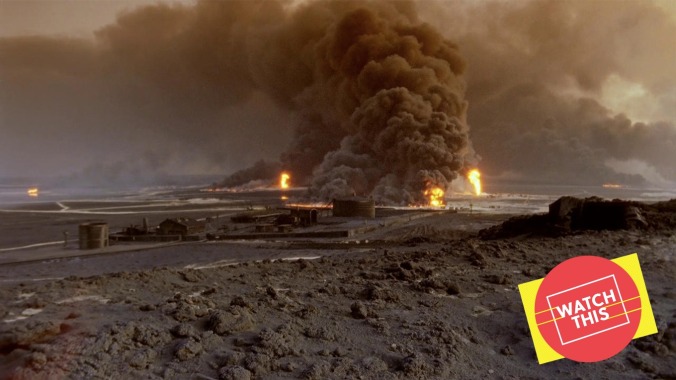With Lessons Of Darkness, Werner Herzog turned the Gulf War into science fiction

Watch This offers movie recommendations inspired by new releases, premieres, current events, or occasionally just our own inscrutable whims. This week: With Werner Herzog’s Fireball: Visitors From Darker Worlds hitting Apple TV+, we’re highlighting some of the iconic director’s best documentaries.
Lessons Of Darkness (1992)
Probably the earliest example of an apocalyptic vision in cinema is found in “The Oil Gush Fire In Bibiheybat,” an approximately 40-second film shot in August of 1898 in what is now Azerbaijan by the photographer Alexander Mishon. The environmental horror of this documentary fragment is like something out of religious prophecy. We see a pillar of flame reaching into immense clouds of black smoke and wooden derricks that resemble church steeples or minarets, and then it’s over. As in so many of these early films—which from our point of view are basically shots, discrete but lacking in beginning and ends—a sense of what-are-we-looking-at mystery is inevitable.
However, Mishon (sometimes spelled “Michon”) knew the subject matter well, as he had spent the preceding decade running a portrait studio in Baku and documenting the environs of what was then the center of the global petroleum industry. This is to say that, while “The Oil Gush Fire In Bibiheybat” is in many ways typical of its era’s postcard style, the fire—combined with the rarity of seeing something in deep focus against a darkened sky—looks unreal, like an old-fashioned miniature special effect.
If it’s possible to think of Michon’s film as a spiritual predecessor to Werner Herzog’s Lessons Of Darkness, which was shot almost a century later in the post-Gulf War oil fields of Kuwait, it’s in part because the latter still feels like the culmination of the Herzogian documentary aesthetic and its attempts to recapture those cryptic qualities that are so often found in the early films. There is an argument to be made that all great filmmakers are in a sense trying to return the medium to its origins. In the case of Herzog, this has long entailed an affinity for the silent cameramen: their sense of landscape; their nomadic ways and indifference to fact; their overall perspective on a strange, undocumented planet. He has always been the last of the romantics.
In our own hyper-contextualized age, the fundamental air of mystery must be cultivated or faked. In that respect, Lessons Of Darkness is a work of deliberate impurity: too vague to be an essay, too metaphysical and contrived for journalism, too short to even be considered a feature, sweeping the landscape in majestic aerial shots only to periodically confront us with its human inhabitants. But for all of its ironic detachment, it is unmistakably a film about war and wreckage, surveying craters and monumental industrial ruins from a Herzogian flying-saucer’s-eye view.
An outside observer is not necessarily an impartial one. Politically, the movie might be called a filmmaker’s middle finger to the deceptions and trivializing power of cable news, which had turned Desert Storm into the first 24-hour-news-cycle war. The level of aestheticization is high, from the fictitious epigraph to the trademark musings of Herzog’s narration to the soundtrack (the transportive overtures of three Wagner operas and Grieg’s “The Death Of Aase,” more redolent of Alpine and Scandinavian scenery than of the aftermath of the Iraqi army’s scorched-earth retreat). There is also the dual ambiguity of the oil fire, which seemed obvious even in Michon’s time; one is never completely sure whether it represents our own ruinous industrial ambitions or the more elemental forces of potential destruction that make us look small.
Like so many works of politically pointed science fiction, Lessons Of Darkness confronts us with abnormalities that we recognize to be facts of our own civilization. This is what we find in all of Herzog’s best films, which are puzzled, sometimes even maddened by both nature and human behavior, reminding us that, on our own indifferent home world, we are, on an existential level, aliens.
Availability: Lessons Of Darkness can be streamed for free on Tubi (with ads) and Shout! Factory TV. It can also be rented or purchased digitally from Amazon, Google Play, Apple, YouTube, or Microsoft.